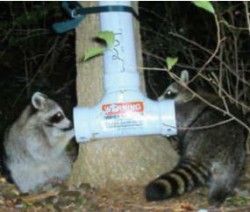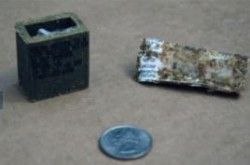Following Rabies Scare, Area Raccoons To Be Vaccinated

After a raccoon tested positive for rabies in Bensonhurst last month, the city announced today that vaccine-treated bait will be placed around Southern Brooklyn to prevent the potential spread of the virus.
Raccoons will be vaccinated using bait containing oral rabies vaccine in parks, public green spaces, and on private property along the southern border of Brooklyn and Queens. The brown, fish-scented bait will conceal a small packet of pink colored liquid vaccine about one square inch in size. When raccoons chew the bait, they will become immunized.
It’s an expansion of a program initiated by the United Stated Department of Agriculture and Cornell University, and is already being conducted in Long Island and parts of upstate New York.

The bait itself is harmless to humans, but exposure to the liquid can cause a rash. If neighbors somehow stumble across one of the fixed bait stations, rummage through the bait, puncture the packet and get the liquid on their skin – an unlikely scenario – they’re advised to wash the affected area with warm, soapy water and notify the Poison Control Center at (800) 222-1222. The bait is not harmful to pets, but can cause vomiting if too much is consumed.
More information about the bait program can be found here.
The Department of Health is also sharing the following tips to help prevent the spread of rabies:
- Get your cat or dog vaccinated for rabies. It’s the law.
- Check with your vet to see if your pet is up-to-date with vaccinations. Pets need a rabies booster shot every one to four years.
- Call 311 or visit nyc.gov and search for “rabies” for information on rabies.
- Always keep cats, even vaccinated cats, indoors and supervise your dog when it is outdoors. Cats and dogs that roam could come into contact with a rabid animal, get infected, and then expose you.
- Avoid wild, stray or unfamiliar animals. Keep children and pets away from them too.
- Avoid any wild, stray, sick, or injured animal, no matter how helpless it looks. Even stray cats can be dangerous.
- Raccoons, skunks, and bats are more likely than other animals to have rabies. Be careful around them—especially if they appear sick or behave strangely. For example:
- Normally tame animals, like cats, acting too aggressive or wild animals acting too friendly.
- Difficulty walking around.
- Night animals like raccoons walking around during the day.
- Call 311 and ask for Animal Care and Control to find out what to do
- Keep garbage in tight containers to avoid attracting animals.
- If you are bitten by an animal, wash the wound, consult a doctor, and call 311 or Poison Control to report the bite.
- First, wash the wound with soap and water IMMEDIATELY.
- Talk to a doctor right away to see if you need a tetanus shot or a rabies evaluation. If you don’t have a regular doctor, go to a hospital emergency room.
- Call 311 to report the bite. After business hours, call Poison Control at 1-800-222-1222.




